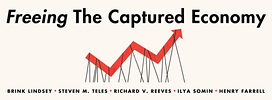In his thoughtful response essay to Lindsey and Teles, Henry Farrell devotes some space to criticizing my own earlier response essay. Farrell argues that my emphasis on the need to limit government in order to minimize regulatory capture ignores “the key problem which animates Lindsey and Teles – that some forms of regulatory capture are far more pernicious than others.” In particular, he follows Lindsey and Teles in arguing that “we have moved from a world in which much of the capture happened sideways, providing benefits to a broad cross-section of society, to one in which regulatory capture is redistributing income upwards to a narrow elite, creating a feedback loop of increasing inequality.”
I don’t deny that some forms of regulatory capture are more harmful than others. But both types are facilitated by a large and complicated government that is difficult for rationally ignorant voters to monitor. The role of ignorance and complexity in facilitating capture is a central feature of Lindsey and Teles’ analysis of the four issues they cover in the book, which they consider to be examples of especially pernicious capture. In addition, at least some of the examples of capture that might be described as “sideways” redistribution are still highly pernicious, including for the poorest and most disadvantaged sectors of society. Lindsey and Teles cite the cases of pre-1970s airline and trucking regulation, and severe pre-1965 immigration restrictions, among others. Such policies did indeed have some nonwealthy beneficiaries. But they also inflicted great harm on society by creating deadweight losses. In addition, they disproportionately harmed the poor. For example, by greatly raising the cost of airline tickets and truck transportation, pre-1970s regulations effectively priced the poor out of these markets – a much greater harm than was inflicted on more affluent consumers, who “merely” endured higher prices that they could still pay. Severe immigration restrictions condemned many would-be migrants to lives of poverty and oppression in the Third World. And so on.
Farrell also claims that the sort of “weak state” I favor would just lead to more “open predation” by the wealthy. But this overlooks the fact that a strictly limited state need not be “weak” in the sense of more vulnerable to capture. Much the contrary. By narrowing and simplifying the range of government functions, it could be more transparent to voters and easier for them to monitor – a point I tried to make in my initial response, that builds on Lindsey and Teles’ own analysis of the ways in which intense public focus can make abusive policies harder to get away with. If wealthy elites can only abuse the powers of the state by engaging in “open predation,” that is easier for voters to understand, monitor, and punish than more indirect forms of capture that are easy for nonexperts to miss.
Finally, Farrell cites Christopher Achen and Larry Bartels’ important recent book Democracy for Realists for the proposition that “democratic ‘realism’ need not lead to skepticism about democracy; it can lead as readily to a focus on the key role played by intermediating institutions such as political parties.” But Achen and Bartels in fact show in great detail how partisan bias often actually exacerbates the impact of political ignorance, by skewing voters’ judgment of public policy, and even their perception of basic facts, such as the rate of inflation and unemployment. Particularly in an era of severe polarization, parties exacerbate the negative impact of political ignorance at least as much as they may ameliorate it. For reasons I discuss in more detail in my review of the book, its analysis of voter ignorance (which is actually more pessimistic than my own) reinforces the cases for limiting and decentralizing government, though that is not the authors’ intention. Farrell is, of course, right that markets have important information problems of their own. But rarely are these as severe as those that beset rationally ignorant and highly biased voters. At the very least, government regulation stands a better chance of correcting market failures without creating massive government failures if it is kept within relatively tight bounds that leave fewer opportunities for capture than exist in the sprawling modern state.

